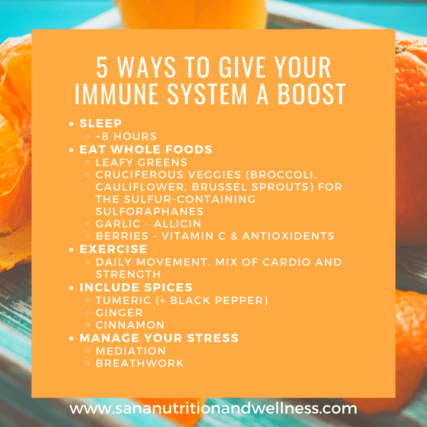It’s Fall – Time to Boost Your Immune System!
It’s cold and flu season ya’ll
The crisp air, cozy sweaters, and the aroma of fall cooking are comforting. But alongside these seasonal delights, we know that cold and flu season is here. There are simple, everyday strategies we can adopt to support our immune systems.
1. Sleep
Getting adequate sleep—around 7-9 hours each night—is crucial. Sleep is when our bodies repair and regenerate, especially our immune systems. During sleep, the body produces cytokines, which are proteins that help regulate the immune response, especially during times of stress or infection. Prioritize sleep to ensure your immune system is functioning at its best.
2. Eat Whole Foods
A nutrient-dense, whole-foods diet is key to supporting your immune system. Focus on these immune-boosting foods:
- Leafy Greens – Spinach, kale, arugula, and other leafy greens are rich in vitamins A, C, E, and K, along with essential minerals like iron, calcium, and magnesium. These greens are also high in fiber, which helps maintain gut health—a critical factor for immune function.
- Cruciferous Vegetables – Broccoli, cauliflower, Brussels sprouts, and cabbage are rich in sulfur-containing compounds like Sulforaphane. Sulforaphane supports detoxification pathways and helps activate key immune cells like natural killer (NK) cells.
- Garlic – Contains Allicin, a potent compound known for its antibacterial, antiviral, and antifungal properties. Allicin also has immune-modulating effects, helping to regulate inflammation.
- Berries – Berries like strawberries, blueberries, and raspberries are packed with Vitamin C and antioxidants, which help neutralize harmful free radicals and support immune cell function.
3. Include Immune-Boosting Spices
Spices not only add flavor to your meals but also provide powerful immune-supportive properties:
- Turmeric (+ Black Pepper) – Curcumin, the active compound in turmeric, has anti-inflammatory and immune-boosting properties. Black pepper enhances curcumin’s absorption, making it more bioavailable and effective.
- Ginger – With strong anti-inflammatory properties, ginger helps reduce oxidative stress and supports immune function. It’s also great for digestion, which is closely linked to immune health.
- Cinnamon – Not only does cinnamon add warmth and flavor to dishes, but it also has antimicrobial properties, helping to fight off bacteria and fungi.
4. Exercise Regularly
Daily movement is vital. A mix of cardio and strength training helps boost circulation, which allows immune cells to move more effectively throughout the body. Regular physical activity also helps reduce chronic inflammation, which can dampen the immune response.
5. Manage Your Stress
Stress triggers the release of cortisol, a hormone that, in excess, can suppress immune function. Chronic stress keeps the body in a constant state of inflammation, making it harder for the immune system to defend against new invaders. Managing stress through meditation, deep breathing, mindfulness, or other relaxation techniques can reduce this inflammatory response and promote a healthier immune system.
By incorporating these simple practices—getting enough sleep, eating nutrient-dense whole foods, using immune-supporting spices, and managing stress—you can help your body stay strong and resilient throughout the fall and beyond. Let’s focus on nurturing our health from the inside out and stay well!





